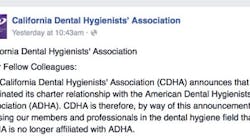ADHA responds to Facebook post: California's withdrawal can't happen yet
The American Dental Hygienists’ Association (ADHA) responded to a Facebook post by the California Dental Hygienists’ Association (CDHA) that stated the state association would be severing its relationship with the national association. The ADHA said the CDHA announcement was premature.
The ADHA pointed out in an email to DentistryIQ.com editors that the state association would have to complete the process at the CDHA house of delegates meeting in Fresno in June.
“We do not feel your (DentistryIQ.com) article and social media post accurately reflect the situation,” the ADHA said. The ADHA referred to the existing charter agreement between the two associations. “Since this is written into the CDHA Bylaws, it is only with House of Delegates action that can end the chartered relationship. We feel that it is premature and inaccurate to report that based on the CDHA Board’s unilateral action, that they have seceded from ADHA at this time.”
The national association said it would “optimistically” await the results of the state meeting, conducting “business as usual” with California dental hygienists.
The CDHA Facebook post on April 28 said, “ADHA is now communicating directly with CDHA members in an effort to persuade CDHA's House of Delegates to reverse the Board's decision when the House meets at its June 3–5, 2016 meeting.”
The ADHA gave DentistryIQ a copy of an April 25 letter from ADHA president Jill Rethman, RDH, that was distributed to California members of the ADHA. Rethman encouraged California dental hygienists to discuss the issue with ADHA delegates before the June meeting.
Rethman said, “The American Dental Hygienists’ Association’s goal is to ensure that we maintain a strong relationship with all 51 constituents so that we can collectively represent all U.S. dental hygienists, advance the profession, and increase access to oral health care. We value every single member.”
Her letter did criticize the decision by the CDHA’s Board of Trustees by saying, “As a fellow District XI member, no one is more disappointed in the action CDHA’s Board has taken than I.”
In a related development, Catherine Draper, RDH, a delegate for the state’s Santa Clara Valley Dental Hygienists’ Association, shared a letter with DentistryIQ regarding regulations covering nonprofit associations, saying legal requirements have changed since the first alliance between the ADHA and CDHA began more than 90 years ago.
The Santa Clara association shared the following with its members:
Many changes have taken place in recent years in the federal and state rules and regulations for not-for-profit trade, 501(c)6 associations, like ADHA and CDHA. Of particular importance are the reforms stemming from the Sarbanes-Oxley (SOX) federal legislation following the corporate accounting scandals of Enron and other companies back in 2002. While most SOX laws refer to corporations, the Internal Revenue Service is looking much closer at not-for-profit business practices as well. In 2008, the IRS made changes to the Form 990 that all not-for-profit organizations are required to complete. In addition to accounting for revenue and expenditures, organizations must now answer specific questions relating to governance policies and procedures.
As these new governance reporting requirements were being made, ADHA was faced with looking at the 50 constituents and the over 300 components that are all part of the tripartite ( 3 part) structure. After studying the pros and cons of a tripartite organization and following a mega-issue discussion at the ADHA Annual Session in 2013, the ADHA Board of Trustees voted to retain the current tripartite structure and authorized the ADHA staff to work with legal counsel to develop a new charter agreement that would, among other things, ensure legal, fiduciary and ethical compliance for a 501(c)6 association.
The constituent (state) charter agreement was adopted by the ADHA Board of Trustees in March, 2015 and details of the agreement were discussed with state representatives at the ADHA Annual Session in June 2015. Since then, there have been a number of live and recorded WebEx sessions open to state leaders for discussing the terms of the new charter.
A fundamental requirement of the new charter relates to the legal structuring of components. The charter will require components to incorporate and follow the legal requirements of incorporation or to choose to be an unincorporated component. An unincorporated component can continue to carry out their usual activities but operates with committees rather than officers, does not keep a checking account and may not enter into contracts. The unincorporated component would need to submit to the state organization for any reimbursement of funds. The new charter also includes protection of the ADHA logo and universal branding in addition to reporting requirements for overall association accountability. Once signed, states have a transition time spread over 36 months to adopt the necessary changes for compliance.
DentistryIQ asked the CDHA to elaborate about its Facebook post, but the state association declined to do so, saying the upcoming house of delegates meeting would be “when the final decision is made … as the letter [Facebook post] states, this is being discussed at our House of Delegates in Fresno.”
Comments to the Facebook post offered varying opinions, including:
- Good for you guys. The ADHA did not help me or even try back in the day for me. That's when I pulled out and it has gotten only worse ... Let them enjoy all their perks on somebody else's money.
- Where California leads, others states will likely follow!
- Too bad. You guys will be noticeably missed. We preferred to stay with ADHA and work to improve it.







